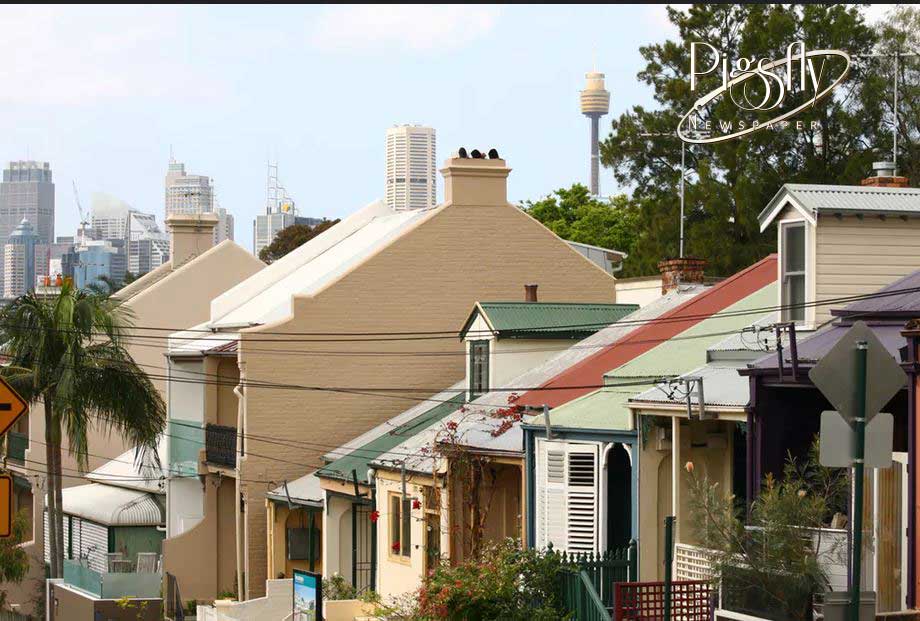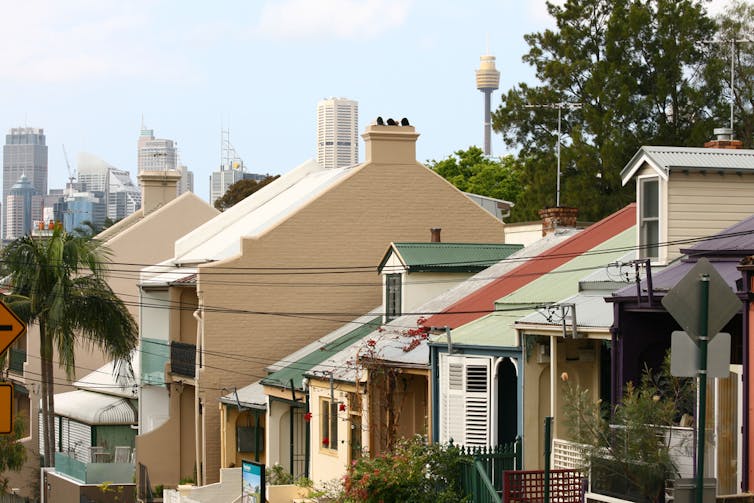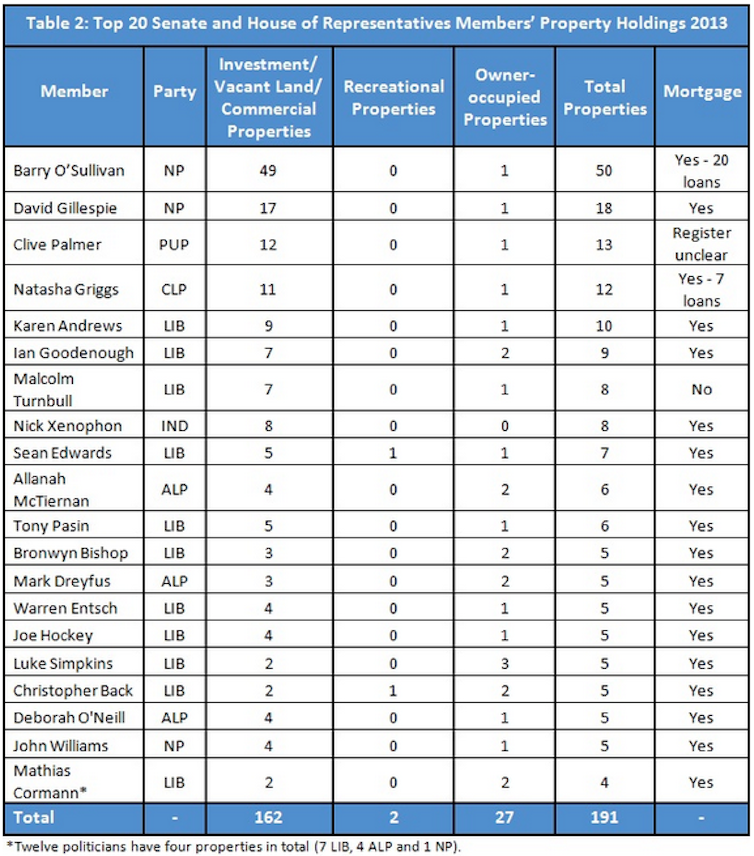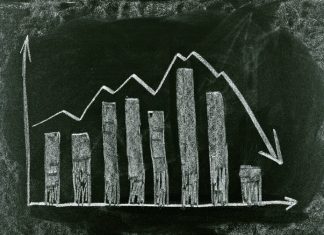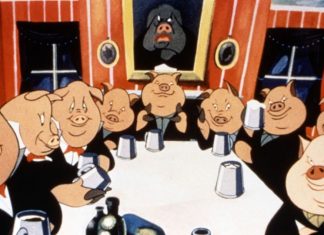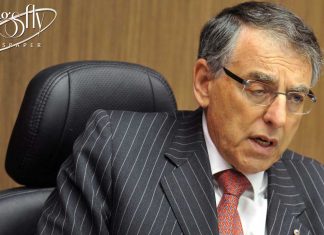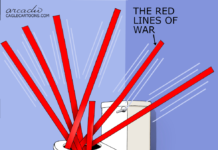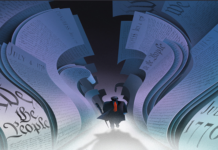Politicians and
negative gearing
Canberra’s 226 MPs and senators own 524 properties between them – an average of 2.4 each – analysis by the ABC has found.
Only 10 federal politicians don’t own property, meaning 96% of the total do, compared to the national average of just above 50%.
And while the government remains strongly opposed to changes to negative gearing, the Coalition’s 105 MPs and senators collectively own 290 properties and nearly half of them, 139, are investments.
Talk about skin in the game: Australia’s 225 federal politicians have $370 million tied up in the property market.
And that’s a conservative estimate based on the assumption that each of their 561 declared properties is worth the average Australian dwelling price of $656,800.
If politicians owned $370 million worth of shares in fossil fuel companies, no one would trust them to make sensible or impartial decisions on environmental or renewable energy policy. So on housing affordability – the great barbecue stopper of modern times – it makes sense to keep your expectations very low indeed.
Here is the ABC’s breakdown of who owns what, based on political affiliations:
Words that matter. What’s a franking credit? What’s dividend imputation? And...
Words that matter. What’s a franking credit? What’s dividend imputation? And what's 'retiree tax'?
There are words you’ll need to understand. But imputation is complex,...
Negative gearing changes will affect us all, mostly for the better
Negative gearing changes will affect us all, mostly for the better
Don’t have a negatively geared investment property? You’re in good company.
Despite all the talk...
Vital Signs: why now is the right time to clamp down...
Vital Signs: why now is the right time to clamp down on negative gearing
Negative gearing makes it hard for renters to become home owners....
The curious incentives and consequences of negative gearing
Charis Palmer, The Conversation; Georgina Hall, The Conversation; Helen Westerman, The Conversation; Jenni Henderson, The Conversation, and Wes Mountain, The Conversation
Negative gearing was one...
Election FactCheck Q&A: does the government spend more on negative gearing...
Saul Eslake, University of Tasmania
The Conversation is fact-checking claims made on Q&A, broadcast Mondays on the ABC at 9:35pm. Thank you to everyone who...
How the Property Council is shaping the debate around negative gearing,...
Nicole Gurran, University of Sydney and Peter Phibbs, University of Sydney
We see their spokespeople quoted in the papers and their ads on TV, but...
Negative Gearing! Trust the PM, Joe Hockey and Tony Abbott or...
On the 26th April 2016 night Leigh Sales became the rock star of journalism. With deft questioning she enabled Prime Minister Malcolm Turnbull to...
Negative gearing changes will affect us all, mostly for the better
Negative gearing changes will affect us all, mostly for the better
Don’t have a negatively geared investment property? You’re in good company.
Despite all the talk...
Franking credits: everything you need to know
What are franking credits, how do they work and who is entitled to them?
What is a franking credit?
Franking credits are only available to...
Taxpayers should not be subsidising lifestyle of wealthy retirees
A reverse death tax that helps the rich
The dividend imputation system is a rort Australia can’t afford, write Emma Dawson and Tim Lyons.
Australia’s dividend...
Political donations 2017-18: search all the declarations by Australian parties
Today Australian voters have discovered who was bankrolling the nation’s political parties more than 18 months ago.
Gambling lobby gave $500,000 to Liberals ahead of...
The truth about political donations: there is so much we don’t...
Approximately $15 million in donations was disclosed by donors, a small proportion of parties' total funding.
The Liberal Party received $95 million in funding across...
Coalition’s changes to finance laws could be a ‘dreadful step backwards’
“What is actually the point of undoing it? One actually asks, why do you want to do this?” he said.
“Why is it in the...
The minister the money and the mine. How a rotten deal...
As waiters took orders for toasties and coffee at the Little Teapot Café in the sleepy coastal hamlet of Davistown, NSW, four men were...
Australia’s biggest gambling operators be warned – media pack is baying...
Often enough, a single news organisation will crack an important story or begin a worthy crusade and the rest of the media ignore it...
The latest casino scandal is just another sideshow
Another casino, another official investigation, more allegations of money laundering, organised crime links and fraud.
At a casino? Gee, who would have guessed?
And, again, Star...
The uncivil Mr Jones
View from The Hill: The uncivil Mr Jones
Michelle Grattan, University of Canberra
The row over shock jock Alan Jones and what will be displayed on...
History repeats: how O’Farrell and Greiner fell foul of ICAC
In April 2014, the New South Wales Independent Commission into Corruption (ICAC) claimed its biggest political scalp in two decades. Liberal state premier Barry...
No risk: The family who own Tasmania’s gambling industry
Every single gaming machine in the state is theirs. The Keno is theirs. They own one of the two casinos and a controlling stake...
🌟 Stay in the Loop with a Twist!
Crave more than just the run-of-the-mill news? Dive into the audacious and razor-sharp commentary at Pigsfly Newspaper! Click your way to spectacle and insight—make sure to hit the like button and follow us on Facebook Pigsflynewspaper. Ready for news that packs a punch? Visit us at Pigsfly Newspaper and never miss a beat. Because why just read the news when you can experience it? Let’s make waves together! 🚀


